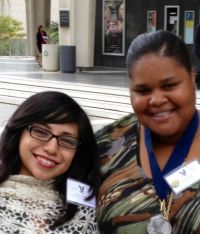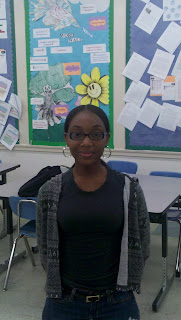SW: Why do the girls participate in the program?
WLP: The girls participate because they feel empowered by learning about the social history of feminists of color and connecting them to their lived experiences. Many feel as though they’ve been shafted by mainstream public education’s drill and kill high stakes testing regime that shuts out meaningful critical engagement with the contributions, social capital, cultural knowledge, and liberation struggle of communities of color in the U.S. and beyond. For example, during our annual Denim Day outreach we don’t just address the objectification and abuse young women experience in their daily lives and relationships but also examine the impact of media and social imaging of women of color. Because white European women have always been constructed as the universal beauty and human ideal, Black, Latina, Asian, and Native American women are sexualized in ways that European American white women have never been. Pretending like "all women" are oppressed by sexist exploitation ignores the role racism, segregation and white supremacy play in the way black and Latina women are brutally marginalized in the workplace, denied access to reproductive health and demeaned/ marginalized in media portrayals of "proper" or even so-called empowered femininity. When we address sexual harassment and sexual assault we contextualize them vis-à-vis the history of exploitation and commodification of the bodies of women of color through slavery, imperialist occupation and dispossession.
SW: What is the program focused on accomplishing?
WLP: We educate young women of color in feminist humanist practice. We empower them to take ownership of their lives and communities by connecting the struggles of previous generations with their present and future. We specifically develop curricula on women’s rights, social histories and activist traditions. The program also focuses on peer education and training on HIV/AIDS prevention, sexual assault, intimate partner violence, reproductive justice, media literacy and safe space creation for LGBTQ youth.
We also provide college resources for financial aid, tutoring, scholarships, job and internship opportunities and undocumented youth resources.
 SW: What changes do you see in the girls as they progress through the program?
SW: What changes do you see in the girls as they progress through the program?
WLP: They become more confident, they question and challenge social norms, and they begin to view themselves as scholars, intellectuals and activists. They learn how to collaborate with other groups, train their peers, respectfully debate viewpoints they disagree with, and engage with adults as stakeholders in the school-community. They don’t accept the criminally low expectations that mainstream society imposes on them, and, most crucially, they begin to think outside of the box about the kinds of professions and roles they’ve been told they’re best suited to. We’ve had a number of young women decide to be doctors, attorneys and academics as a result of their involvement with WLP. We recently hosted a young African American planetary geologist (now a program manager at the California Science Center) who was literally the only black woman to receive a B.S. in astrophysics in her graduating class at UCLA. Most of our students had never heard of a black female scientist, much less met one in the flesh. I think being exposed to a cross-section of female of color professionals and hearing their stories struggling with racism, sexism and homophobia in male-dominated fields has been invaluable to them. But far more than just viewing themselves as high achievers they become critically conscious of the way institutional oppression limits and dehumanizes their communities. The schools where WLP is based are at the epicenter of what has come to be known as the school-to-prison pipeline. Many of our youth see the devastating effects of mass incarceration up close and personal. They see their peers get sucked into the dead end cycle of low wage employment, unplanned pregnancy, juvenile detention, probation and homelessness. So our intense focus on writing, public speaking, publication, peer education, feminist consciousness-raising and college has a direct impact on their outcomes as well as that of the overall school-community.
SW: What cultural forces do you see the girls struggling with? One of the biggest is that sexism and misogyny don’t matter.
WLP: In the U.S., most girls are not socialized to "see" these forces in their lives and reflexively dis-identify when they do. One of the greatest challenges our students face when they do peer training is framing sexual abuse and degradation as a human rights violation. Intimate partner violence, sexual assault and STD contraction is extremely high amongst girls of color. But because they are always told that racism is the "real" issue in their lives, and that men of color "have it harder", they often overlook sexism and gender discrimination. Over the past decade prostitution and sex trafficking have become a major factor for younger girls in our communities. In addition, we’ve been having more discussions about the impact porn culture and reality programming has on their lives and psyches. Some girls at the schools where WLP is based have even filmed themselves committing pornographic acts because they are so starved for attention and validation. Others are coerced into exposing themselves online in order to please a "boyfriend" or adult predator who is exploiting them for sex. Certainly much of the normalizing bitch/ho/pimp/hustler pop culture language in mainstream media has facilitated these trends. Girls see hyper-sexuality as a means of getting validation and affirmation from males and this leads to destructive internalized sexism/ self-hatred. This is especially lethal for African American girls because of the prevailing historical association of black female sexuality with pathology, criminality and "welfare queen" shiftlessness.
SW: What have you learned from the participants?
WLP: Feminist organizing and education in WLP is driven by students’ lived experiences, community context and cultural knowledge. Culturally relevant teaching means that so-called adult experts/authority figures like me become students in the teaching and learning process. Unlike many of my students, I grew up in a middle class family and never had to worry about whether or not I was going to go to college. I was never expected to sacrifice my education to be a breadwinner and/or primary caregiver, nor did I have to struggle to find a place to sleep at night. As an American citizen I’ve never had to hustle to find financial aid resources for college while worrying about deportation. And as a straight girl my sexual orientation was never questioned, marginalized or demeaned by teachers, textbooks and the general school-community. Moreover, even though black youth were criminalized when I was in school (hostile encounters with the LAPD were certainly a vivid part of my upbringing), the experience was not as insidious as it is today. Virtually every young person we work with knows someone their age that has been involved in the system. Whole families have been destroyed by racist sentencing policies, leading to greater numbers of African American youth being placed in foster care and/or becoming homeless. This perspective drives my work with youth in WLP and other programs. Drawing from their own experiences, the students help shape our curriculum and have an active role in developing instruction. The students lead these workshops and their frontline experiences with misogynist dehumanization drive much of our in-class media literacy initiatives. Students analyze how specific images, songs, and shows socialize young women and men to view violence against women as normal and acceptable. They gain greater insight into and empathy about the everyday inequities girls of color face. Ultimately this approach allows us to explore feminist alternatives vis-à-vis busting stereotypes, building healthy relationships, boosting academic expectations and improving campus climate.
SW: How can the general public support the girls and your efforts?
WLP: We’re trying to expand WLP into other schools to develop more feminist humanist programming. It’s immensely helpful when organizations and groups like yours promote our students’ work. We’ve also been working with Black Skeptics Los Angele to secure grant funding. This year, BSLA launched the First in the Family Humanist scholarship fund to support students that are historically under-represented in the college-going population. The fund provides scholarships for undocumented, LGBTQ, foster care and homeless youth (for more information contact blackskeptics@gmail.com).

 SW: What changes do you see in the girls as they progress through the program?
SW: What changes do you see in the girls as they progress through the program?






